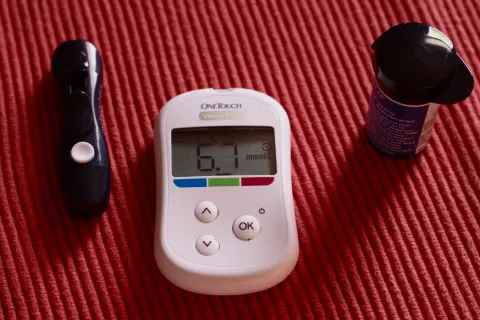Small study finds B12 injections ease autism symptoms in some children
Carefully controlled study provides evidence that methyl B12 can ease autism in a subgroup of children with the disorder
March 23, 2016In a small but carefully controlled study, regular injections of methyl B12 produced an overall improvement in autism symptoms in some children who have the disorder.
The researchers found that the behavior improvement occurred primarily in a subgroup of children who showed particular blood chemistry changes after the methyl B12 injections. In these children, the authors propose, methyl B12 appears to have improved their cells’ ability to methylate DNA. DNA methylation is vital for turning a cell’s genes on and off at the appropriate time. Some earlier research has suggested that the process is impaired in some people with autism.
The new study, supported by a grant from Autism Speaks, appears online in the Journal of Child and Adolescent Psychopharmacology.
It is the first blinded, placebo-controlled trial of methyl B12 injections, which have grown in popularity as an alternative treatment for autism. In this type of carefully controlled trial, neither the participants nor the researchers know who is getting the actual treatment and who is getting a placebo, or dummy treatment, until after the trial ends.
“It’s very important to have placebo-controlled studies like this one,” comments developmental pediatrician Paul Wang, Autism Speaks senior vice president for medical research. “Open-label studies, where everyone knows they’re getting the treatment, commonly show promising effects that reflect expectations rather than treatment effectiveness.”
Dr. Wang cautions, however, that some of the new study’s results were not consistent. For instance, the researchers found significant improvement on one overall measure of autism symptoms. But this impression of overall improvement did not translate into measurable improvements in specific behaviors such as sociability, communication, repetitive behaviors or other core symptoms of autism.
Study protocol
A total of 50 children, ages 3 to 7 completed the study at the University of California, San Francisco. Roughly half received injections of methyl B12 (75 micrograms per kilogram of weight) every 3 days for 8 weeks. The other children received a dummy shot of saline solution that looked like the real treatment.
At the beginning and end of the study, the investigators took blood samples to assess a wide range of metabolic measures. They also evaluated the children’s autism symptoms at the start and end of the study using three measures: the Clinical Global Impressions-Improvement scale (CGI-I), the Aberrant Behavior Checklist and the Social Responsiveness Scale.
At the end of the trial, the children who received the methyl B12 injections scored better than those who received placebo on the CGI-I scale (2.4 points versus 3.1). The score represented an overall rating, or “impression,” of symptom severity by a physician who did not know which children received the B12.
But the other two measures – which involved rating the severity of specific autism symptoms – showed no significant differences between the children who received the treatment and those who got the placebo.
Responders and non-responders
Of particular interest to the researchers, the behavioral improvement in the methyl B12 group was concentrated among 10 out of 17 children whose bloodwork suggested they had a positive biological response. These “responders” showed increased levels of methionine and other blood chemicals associated with decreased cell and DNA damage.
“Although these findings are preliminary,” the study authors conclude, “this is an exciting finding that suggests that treating a known metabolic abnormality – impaired methylation capacity – holds the potential to improve [autism] symptoms.” They call for support of a larger controlled trial to check and clarify their results.









